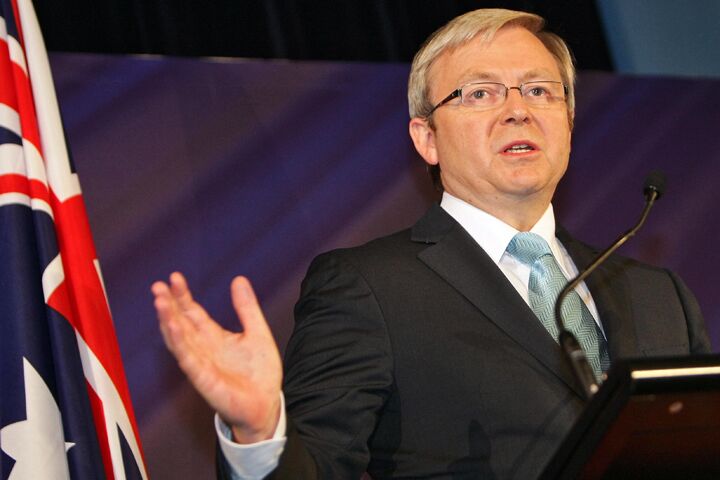
Australia—Reality Dawns
The present center-left government of the Australian Labor Party inherited a healthy budget surplus when it took over leadership of Australia last December following 11 years of conservative leadership under Prime Minister John Howard.
Now the surplus is just about gone, and Australia’s current federal government, not yet even a year in office, is faced with some very hard decisions—decisions that may force Prime Minister Kevin Rudd into rescinding a number of his rosy electoral promises.
Federal Treasurer Wayne Swan told journalists on November 5 that “The global financial crisis has smashed a $40 billion hole in the [Australian] budget.”
This week, the indicators showed that economic recession, already holding the United States, Britain, the European Union, Japan and five other leading Asian economies in its grip, looms large on the Australian horizon.
Commenting on the fact that Australia’s leading index slowed to 1.1 percent from 2.5 percent in August, Westpac Bank’s chief economist, Bill Evans, declared that “This is a disturbing fall in the growth rate. Growth in the first half of 2009 will be barely positive, with a decent risk the first two quarters of growth in 2009 could be negative” (Bloomberg, November 19).
This news just compounds the record drop in business confidence that the nation experienced last month.
There’s a triple whammy now hitting Australia.
“With six and a half billion people in the world, the demand for resources has never been greater. This demand—especially from China and India—is the hidden engine behind Australia’s economy.” Thus opined market analyst Dan Denning back in July.
Three months is a long time in today’s fast-paced global market. The sound coming from that “engine behind Australia’s economy” had, by October, indicated that it slowed down remarkably over that period of time. Reduced growth in China, caught in its own trouble resulting from the global economic meltdown, has cut the nation’s demand for raw materials considerably. The once seemingly unslakable thirst from China for Australia’s raw materials is fast drying up.
Thus Australia is faced with a significant drop-off in demand for its chief exports at the same time that the credit crunch is playing havoc with its banking and finance sector, bleeding into every avenue in its national economy.
Add to this Australia’s seemingly never-ending drought, and you have a triple whammy of a proportion that Australia has not had to face for well over a decade.
The picture that is being presented to the Australian public today is a far cry from that of the honeymoon days of the Rudd government.
When the new government swept to power, it inherited what on the surface appeared to be a healthy economy, bolstered by unprecedented domestic and commercial construction, massive deals on the sale of its mineral wealth, and continuing capital investment in new developments within its minerals and energy resources and precious and heavy metals industries.
These developments buoyed an economy that appeared to be thriving despite the continued seemingly endemic drought that has ripped the heart out of a good deal of Australia’s arable land over the past 10 years, devastating much of its once-thriving agricultural industry.
Now Australia stands at a shaky economic crossroads.
In fact, probably fearful of the electorate associating the dramatic drop in Australia’s economic prospects with its change of government effected barely a year ago, the Rudd government appears to be fudging the figures to paint a rosier picture than in reality is the case. At least that is what Stephen Walters, chief economist in Australia for the global financial company J.P. Morgan Chase, feels. Walters opined recently that “the government clearly doesn’t think the economy’s in recession—I do.”
“We’ve got gdp growth contracting both in the current quarter and in the first quarter next year; now that in itself is going to drive unemployment much higher than the government forecasts, and therefore there’s a much bigger drain on the government’s budget position,” Walters said. “I think the tidal wave of bad economic and financial news from offshore is going to swamp these official forecasts.”
Australians are a generally hardy lot. They are conditioned to the extremes of weather, in particular ongoing drought, sudden floods and cyclones that periodically ravage parts of the country. Yet, psychologically, Australia is simply not prepared for the suddenness of the reduction in lifestyle that loss of demand within its main export markets, accelerating job cuts, a rapidly sliding housing market, and the current banking crisis are about to unleash on a good part of its population. Australia has had it too good for too long, economically. It has not suffered recession for over 13 years. That’s how long its immediate past growth cycle lasted.
What is in store now for the nation that became known simply as the “lucky country”?
The answer to that question is not a pleasant one, in the short term. The near future will bring a good deal of hardship to Australia. You need to know how to prepare to weather the coming storm. Read our booklets Australia—Where to Now? and The Wonderful World Tomorrow—What It Will Be Like. They will inform you, ahead of the events, in a good deal of detail, just what to expect in the very near future and how to prepare yourself and your loved ones for the difficult times ahead and, beyond that, for a far, far greater future than you could ever have imagined!
